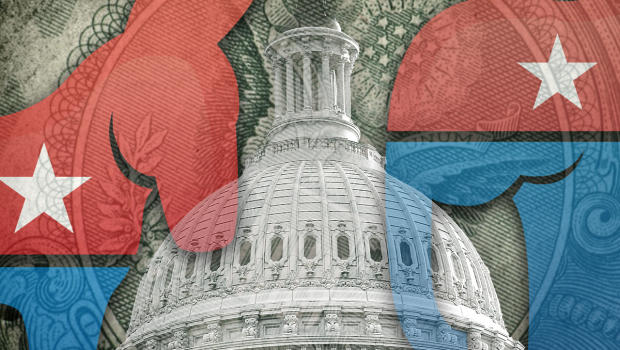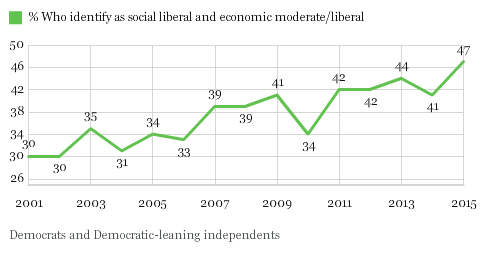Polarization in the Congress
Congress is historically polarized.
 Political scientist Keith Poole of the University of Georgia provides the data:
Political scientist Keith Poole of the University of Georgia provides the data:
In the first plot, we show our primary measure of polarization – the difference in party means – illustrating its evolution between 1879 and the present. As can be seen, the ideological distance between the parties in Congress grew to record levels between the 111th and 112th Congresses. By this measure, polarization in the 112th House (1.069) has doubled from the 96th House (1979-1981, 0.528), and risen over 50% from the 102nd House (1991-1993, 0.676). Polarization in the Senate – which has remained the more moderate of the two chambers – has surpassed its previous high in the 46th Senate (1879-1881, 0.832), with polarization in the 112th Senate jumping to 0.845. It is now safe to say that polarization in Congress has reached an all-time high, exceeding even levels seen during the late nineteenth century.
Here’s the graph:

We can see that the trend started in the 1990s and, of course, that was the beginning of the shift of southern Democrats to the Republican Party, so that explains at least part of the trend.
Still, it is rather amazing that we are at polarization levels not seen in over a century. On one level this is just a set of facts, and facts that confirm, to one degree or another, our perception of the current situation in the Congress (and therefore in national politics writ large). On another level, it is worth remembering that, as I noted in passing earlier this week and in more detail in another recent post (as well as here), we are not in an electoral context that is especially competitive. It is disturbing, in terms of an evaluation of the health of democracy, that we are at a stage of polarization and paralysis in our legislature at a time in which that body is not very responsive to the voters (and does beg the question as to the degree to which the polarization in Congress is a good reflection of the electorate or not). As I have noted before, there is something fundamentally wrong with a situation in which Congressional approval can be in the teens, but reelection numbers are in the 80-90%-range (and with only a handful of seats being competitive). Why do we tolerate this?
Back to the data, Poole notes, as he has for a while, that the polarization is asymmetric: “contemporary polarization of the parties is almost entirely due to the movement of congressional Republicans to the right.” He also notes that the numbers are more dramatic in the House than the Senate:
We have previously written about asymmetric polarization, arguing that the primary driver of contemporary partisan polarization has been the steady movement of congressional Republicans to the right. This trend appears to have continued through the 112th congress. House Republicans – despite a large majority earned in the 2010 midterm elections – have continued their rightward drift, adding more conservative members than moderate members. Senate Republicans also became a more conservative group in the 112th Congress, while Senate Democrats remained mostly ideologically static. Some of this phenomenon is attributable to the fact that Democrats – particularly northern Democrats – were already holding liberal policy positions in the 1960s.
Here’s the partisan comparison in the House:

Here’s the Senate:

The conclusion is rather interesting, especially given the cries of socialism and other dramatics that we hear on a daily basis within the public discourse:
The “Great Society” programs enacted during the 1960s have appeared to represent the leftward edge of what is practically achievable in American public policy (for example, from an ideological standpoint, “Obamacare” is not more liberal than Medicare, enacted in 1965). Congressional Democrats have staked out this position and have mostly maintained it in recent American history. Congressional Republicans, on the other hand, continue to pioneer new ideological territory along on the rightward edge of American public policy. It remains unclear whether and how long this pattern can persist.
Of course, the cries of socialism, etc. make sense in the context of the data: if the party of the right is skewing, ideologically, more to the right then they and their supporters are more likely to see the status quo as more liberal: not because the status quo has changed, but because they have.
It is also why a lot people who were once prominently Republican/conservative no longer see themselves as such.






Jonathan Chait
I think it must also be acknowledged that “conservatism” by definition is a reactionary ideology, existing in opposition to radicalism or liberalism. But radicalism and strong forms of liberalism are almost vanquished in the American political arena, negating conservatism’s purpose and leaving it bereft of enemies to fight.
Conservatism must drift further and further to the right because this makes the center-left, the center and eventually the center-right appear more radical and presents an “other” to strive against. Basically conservatives, having won the political debate, are now engaged in an endless pursuit of enemies to justify the existence of their identities.
@john personna: There is a great deal of cognitive dissonance going on, yes. And this is because, clearly, that we as human beings don’t like to reassess our identities.
@Ben Wolf: Strictly speaking, conservativism properly defined is not reactionary. Conservatism is willing to see some amount of change, but only if it is slow and deliberate. Reactionaries want to roll back to some fantasy past. The problem, or at least one of them, of the modern “conservatism” in the US is that it does have a significant reactionary element that is attempting to reject what has been the basic status quo for almost a century now.
I’m sure that a dying dinosaur thrashed around a lot and made a great deal of noise. But, in the end, it was still dead. And so it is with the Republican Party. The election of Sibelius as President in 2016 should see them off for good.
@Me Me Me: A lot of peopel keep talking about the death of the GOP, but I am not seeing how this comes to pass. As I noted above, and especially in many of the posts I linked to: the structural conditions of US politics are quite likely to contribute to a perpetuation of the current dynamic.
@Steven L. Taylor:
But doesn’t that effectively make it reactionary against what it perceives as radicalism? In other words it reacts as a counter-revolutionary force, even though success in that regard may require acceptance of some greatly reduced degree of change.
@Steven L. Taylor:
There are points of no return. Yesterday the Republicans decided that they’d like to capitulated to Obama every three months instead of just once; today, over at NRO, they are arguing that it is time for everyone to follow Michele Bachmann’s lead on foreign policy.
We are there.
@ Ben…
Conservatism is Conservatism.
It’s a mistake to confuse it with Republicanism.
The Republicans in Congress are not Conservatives.
Most of the candidates in the Republican primary circus were not Conservatives.
The loud-mouths in the Republican Entertainment Complex are not Conservatives.
These days conservatism means change, in a retrogressive direction.
As we know, things change quickly these days. I think the GOP will weather this current storm of disapproval and come out of it more disliked and yet with a few more House and Senate seats.
I honestly don’t think one can come up with a coherent definition of what people mean when they say they’re conservatives these days. What one can do is come up with a list of people who self-identify as conservatives and another list of policies they favor. That’s a denotation rather than a definition.
@Dave Schuler:
If it comes from the Right and has appears to be working, or merely hasn’t done anything yet (see Rubio, M.) it is “conservative”. As soon as it is demonstrated to be stupid and unpopular, it is “not conservative”.
Given the fact that the graph shows southern democrats slowly disappearing, who would be more of the moderate democratic voice, it is pretty clear that democrats as a whole are now more liberal (few moderates) and the GOP has moved further to the right.
I think part of the problem is neither party really wants to look for compromise anymore-both just want to win and say “Look we stuck it to the other side” which means being at the poles is where they want to be.
Also, the GOP seems in many ways to be taking on some of the populism that was common for the southern democrat.
But I do agree that anymore you can’t easily define a conservative but conservative doesn’t necessarily equal Republican.
There was a time that when most Americans saw a problem they would work to solve it.
Now it is “let’ s let the government come up with a solution”. The problem with that is the experts and those who have the necessary skills are usually in the private sector, not in Congress or many of the agencies. Government funding usually comes with increasingly numerous and complex regulations. The Federal involvement in the education, for example, has a truckload of bizarre and confusing regulations and requirements; frustrating principals and teachers.
An excellent book concerning the increasing mindset that government can and should solve all of these problems is “No We Can’ t” by John Stossel.
Stossel is a fool
@Tyrell: Indeed. Back in the good ol’ days private individuals invented things like computers, planes, and the internet without government sticking its nose into things.
Why, if it weren’t for government bureaucracy, I am sure we would have been back to the moon by now.
@Tyrell:
Please name this time. Be specific, and provide dates.
I mean, who could forget the era of private space exploration and the spin-offs technologies it provided?
Click.
@Dave Schuler: You make a legitimate point. The labels lack a firm definition in contemporary politics.
@Tyrell:
Exactly right. It’s not like the good old days, when we relied on private individuals and not the government to fight the Revolutionary War, purchase the Louisiana Territory, annex the Southwest from Mexico, destroy slavery, link the country via railroads, end the Great Depression, establish the SEC and FDIC to defend small investors and depositors, electrify the South via the Tennessee Valley Authority, win World War II, build the federal interstate highway system, defeat polio, send a man to the man, and develop the Internet.
The old language of class conflict is dead. The concept survives as the Conservative/Liberal conflict.
@Just Me:
This demonstrates that you really don’t grasp what the second and thrid charts suggest saying. Yes, there was a liberal move by the Democrats, but it was primarily between 1936 & 1969. There is a slight downward trend, but nothing compared to the upward trend among Republicans.
Look at the sharp upswing in conservatism corresponding to the Regan years. In fact, looking from start to finish, it’s clear that the Republican party is now significantly MORE conservative at the end of the graph that it was at the start of the survey. The Democrats, on the other hand are roughly as liberal as they were when they began (in the house) and actually significantly more conservative in the Senate.
So, this isn’t a “problem” with both sides. Nor are both sides equal in this, despite what you *think*
Democrats are getting more liberal, but not at the same rate that Republicans are becoming more conservative.
Matt you either failed to understand what I was saying or I wasn’t clear.
I didn’t sayin the democrats were more liberal, but that more of the democrats who are in office are liberal, because they no longer have a more moderate voice (they have lost their center).
I said that the GOP was moving to the right. My point is that there used to be a center and there no longer is. Neither the democrats have a center or the GOP as a whole.
@Tyrell:
Well, the private sector certainly has provided us with health care solutions – the most expensive, on a per capita basis, health care system in the world, with private sector insurance rates increasing for over a decade, at 3 times the annual rate of inflation, and we still end up with 15% of the people uninsured. Bravo.
@matt bernius:
I’m not sure I’d call what the Republicans are becoming “conservative” – its nothing like what passes for conservatism in most of the rest of the world. Harper in Canada is a conservative, Merkl in Germany is a conservative, both support public health care, don’t think abortion should be outlawed, support stricter gun control than the US, limit spending on the military etc. And you can go through recent conservative leaders all through Europe, or Japan, and find the same thing. I’d call what the Republicans have “GOP’ism” rather than conservatism.
@C. Clavin:
You are going to have to define conservative for what you are writing to make sense. I would argue that being a fiscal conservative is impossible for politicians in the U.S. and thus, fiscal conservatives are irrelevant to policy and governance.
However, I see zero interest in the Democratic Party for fiscal conservatism but instead a belief that a country and tax and spend its way to prosperity.
@C. Clavin:
It is hard for the left to claim that the public sector can provide world class educationas when virtually all of the elected Democratic politicians send their own children to elite private schools. One can believe that the public sector is good at education when a public school educated, public university educated is elected president.
Considering that the last five Democratic Party nominees for president have been graduates of either Harvard or Yale, it is hard to believe that the left believes that the government can produce world class leaders.
@superdestroyer:
On the other hand, lot’s of Nobel Prizes in the sciences from people who went through public schools (throughout the world) … in fact, I’m not sure that education plays much role at all in the development politicians. Its more an interpersonal skill, like any kind of con game, and one that draws heavy on personality rather than knowledge.
The question of defining “conservatism” and “liberalism” is fun to volley around the court. When I was taking PoliSci 101 (before the last Ice Age) the best explanation was that liberals tend to view society as mechanistic and believe that swapping out one part for another or adding a program here, a benefit there and a tax over there is reasonable. They (well….we) think that a society can be managed and that the bad effects of some social arrangements can be ameliorated by government policies.
Conservatives (to continue this metaphor) perceive a society as organic, almost biological. They do not believe that adding a tax on this group to provide a benefit to that because some social managment plan calls that outcome ‘better’ is actually good for a society. Frankly, I was once a conservative of that sort and still find it to be a compelling outlook.
Of course, one could also say that some human beings are simply more comfortable with changes and risks than others.
But there is really nothing “conservative” about the present-day movement that has stolen that title for itself. The so-called-conservatives who give ideological content to the Repub party and sympathetic media are actually quite radical in their policies and outlook. They have very little respect for the ‘organic’ changes that the NewDeal and GreatSociety programs have wrought. They do not believe in the moral code that makes progressive taxation and entitlement spending seem like good policy.
There is also a large element of plutocracy quietly at work moving their preferred outcome up in the daily news cycles.
And the truly excellent question: How can strong and growing disapproval of Congress coexist with re-election rates in the 90% range for incumbent Congressmen? Eventually, it can’t.
@ Super Duper…
You neglect the fact that the economy does better under Democratic leadership than Republican.
That spending is flat under Obama.
That Bush took a budget surplus and left a 9% contraction of GDP and a massive deficit we are now dealing with.
Also you jump to conclusions about the relationship of where someone goes to school and their education. Going to Harvard or Yale is about many things…not just education.
I understand that is a complex notion…and you won’t be able to grasp it.
@C. Clavin:
So the five Democratic Party nominees who attend Harvard or Yale wasted there money and Bill Clinton would have had the same chance of being President is he had attended the University of Arkansas? I guess making such ridiculous arguments is a way to convince the naive that they world is fair and that progressives really believe the nonsense that they are forced to say in public.
@C. Clavin:
The best economies in the last 50 years was when one party held the White House and another party controlled Congress. President Obama is the first president in a long time that has managed to have a lousy economy with divided government.
Destroyer…
Clinton’s economy was in great shape long before the Republicans came in…they claimed his policies would destroy the economy. They were wrong then. They are wrong now. They like to take credit though, that’s for sure
Obama was handed a crashing economy.
Once youaccept all that that then we can talk.
You seem to want to fault him with not cleaning up the Republican mess…a 9% contraction of GDP in a single quarter…the worst economic crisis since the Depression…fast enough. This in spite of the fact that Republicans ave done everything in their power to hold back the recovery.
@al-Ameda:
I think this is a huge part of the reason we see such polarization, and particularly the hard swing to the right among “conservatives”. Society is changing very quickly, and the pace of change is itself rising quickly.
Not intending to be paternalistic here, but that rapid rate of change is very scary to certain elements of society who have set things up for themselves the way they want them – likely in alignment with the ‘old rules’ from when they were young.
People who cannot adapt to the new world will fight tooth-and-nail to slow down that change, or even try to put things back to a time when they understood the world. It’s ultimately a losing proposition of course.
Conservatism is risk-averse. As SLT said above…Conservatism is willing to see some amount of change, but only if it is slow and deliberate. Conservatism is concerned at it’s roots about the unintended consequences of drastic action, both in the private and public sectors. Conservatism is cautious….it saves up for the proverbial rainy day.
Today’s Republicans want to reinstate the lack of regulation that led us to our current financial crisis. Conservatives know that a strong, vigilant, and fair regulatory state is essential to capitalism’s success.
Todays Republicans spent gobs of money in the good times that Bush 41 and Clinton left them…only to resort to austerity at the very moment it would do the most harm…a deep structural recession.
Todays Republicans launch wars they aren’t prepared for…on the basis of evidence that is wafer-thin….if it’s factual at all. And they do so with no plan for exiting. And they leave them unfinished.
Todays Republicans…up to and including Romney…cling to side economics…a crazy abstract theory that has been shown to be wrong for the past 30 years. Trickle down should be the target of Conservativism…not it’s catechism.
Conservatism has won the war. Only the Democrats have absorbed it. Offered an historic debt reduction deal with 4:1::Spending cuts:Revenue increases Republicans reject it. Republican Pesidential candidates proudly proclaim they would reject even a 10:1 deal. The Republicans have rejected their core beliefs and veered way to the far right in reaction to a Conservative Democratic President.
There is no hint of Conservatism in todays Republican party.
@C. Clavin:
The recession was over well before Clinton was inaugurated. What benefited Clinton the most is going six years with no new taxes, no new regulatory schemes, no new entitlement programs and staying out of costly foreign adventures. Clinton threw the Congressional Democrats under the bus and benefited from it. The worst thing that could have happened to Clinton would have been to have Dick Gephardt. The lessons that the Bush Clan refused to learn from the Clinton Administration is that tending to libertarian is a good thing.
However, President Obama has decided to not throw the congressional Democrats under the bus but has taken position of not being blamed for failures is the most important. I doubt if spending would have stayed flat if the Democrats would have control the House and the Senate for the entire four years of President Obama’s full term. Look at the sticker prices of all of the policy proposals form the Democrats. They will costs trillions in the future and the Democrats just do not care.
@C. Clavin:
Actually modern progressivism is risk adverse. Look at how hard the Democras are working to not be blamed for anything. A Democratic House that refused to pass a budget for two years and a Democratic Senate that has refused to vote for a budget for four years is a good example of risk adverse.
Modern progressives is a movement of snarky hipsters who want the other guy (conservatives ) to make a policy proposal and then nitpicking the proposal to death. Why do not think progressives refuse to say how they would balance a $4 trillion dollar budget while making very expensive policy proposals.
Destroyer…
You really are an idiot.
I work with many people who are Harvard and Yale educated. They are no smarter or dumber than anyone who went to a state school. I have never ever sat in a meeting with a Yalie and thought…oh my, you are so much more brilliant than everyone else Mr. Yale graduate.
You go to Yale and Harvard for an education…and you get a good one if you apply yourself…but what you realy get is connected. Connections…you fool…make the world work.
Clinton may or may not have become President out of the University of Arkansas. But going to Oxford and Yale and gaining those network connections made it exponentially easier.
What really troubles me about people like you is that you have these incredibly powerful opinions…opinions you are not the least bit interested in testing or questioning…yet they are based upon total bullshit. They are based on a childish view of how the world actually works.
You should spend some time thinking about the Dunning-Kruger Effect.
Seriously? The budget meme. How stupid can you actually be?
@C. Clavin:
I take it that the reference to the Dunning-Kruger Effect is just a redo of the usual progressive claim that anyone who does not agree with them is stupid and thus a sign of being intelligent and educated is that one must be a progressives.
Of course, that still does not explain why progressives live their own personal lives in such a different manner than what they claim public policy should be.
The main point that having an Ivy League education does is signal to the world that one was smart enough to actually get into an Ivy League educated. It also benefits the Ivy League students that all of the students there are intelligent unlike the University of Arkansas. The best thing about having an Ivy League education is that most people believe that the dumbest person at Harvard is smarter than the smartest person at the University of Arkansas.
Of course, I wonder if progressives have the cognitive ability to see how foolish they look when they claim the diversity is good and that testing and tracking is bad when they send their own children to overwhelmingly white private schools that have entrance exams.
@C. Clavin:
If nothing else, progressives are risk adverse because they refuse to make any policy proposal that has not been made for decades. Higher taxes, more government, a bigger nanny state has been tried to decades and yet progressives seem to believe that they are so smart that no other solution will ever work.
One last thing before I am done wasting my time on you SD…
What Obama has been proposing are investments in the future. Education, infrastructure, technology, energy. And yes…dignity for the sick, the elderly, and our veterans.
Republicans say we cannot afford those things because we cut the taxes of the wealthy and exploded the deficit/debt. Trickle down theory. It’s been proven completely false…but you can’t let go of your unicorn dreams.
That’s the black and white of it…a simplistic view you might be able to grasp. Maybe.
“…Of course, that still does not explain why progressives live their own personal lives in such a different manner than what they claim public policy should be…”
I went to public HS, a State College, and a State University for my Masters.
Once again…you are just full of shit. It’s pourng out your ears.
The Dunning-Kruger Effect says that you are too stupid to know you are stupid.
Embrace it.
I’m going to say that the chart in this article is part and parcel of the same trend:
In U.S., 46% Hold Creationist View of Human Origins
Notice that the uptick in young earth creationism has come from a corresponding decline in “evolution, with God guiding.”
Our problem really is that the Republicans have become fundamentalists, in the way we used to think only 3rd worlders could become fundamentalists. Science and reason are rejected. This is preached both on Fox News and in the Evangelical pulpit. It depowers our entire society, making more backwards and more stupid.
You know, it is not like you become president first, then go to Harvard. Ambitious students with good grades and test scores try to go there. Those selected have a permanent advantage in life due to the connections they make. Similarly, it is not that parties go looking for Harvard grads. Those who want to run for top political office need to have the political and money connections to do so. Having gone to Harvard means you have al of those correct connections. This is true across both parties. Now, remember the Unz peice and remember that rich, well connected kids are now the ones getting into Harvard and Yale, merit is becoming secondary, and this gets worse.
Steve
@JohnMcC:
Actually, plutocracy has a connection to conservatism, because there is an inherent assumption within conservatism that the current state of wealth distribution is the result of a long set of, to use a word cited in another comment, organic relationships within society over the course of time.
After all, conservatism thinks that the status quo ought to be conserved for the most part. As such, we find that the persons and groups who are privileged in a given society tend to what to preserve the current power relationships. On that level, the Republican Party’s tax policy preferences is quite definitely conservative in that sense of the term.
@ SLT…
Interesting thought. Certainly not in terms of fiscal caution though. It’s clear by their actions they have no interest in deficit/debt reduction. No wonder they are confused. They are a contradiction wrapped in dicotomy.
@C. Clavin: It worth noting, in this vein of thought, that the origins of conservatism in Europe was in the context of the transformation of the aristocracies to democracies. In that context, someone had to protect the traditional rights and significance of the old power classes.
This is part of what Edmund Burke is getting at in “Reflections on the French Revolution”–considered a key example of classic conservatism.
@ SLT…
Burke was fairly contradictory himself.
At any rate…Burke did not believe in god-given monarchical authority and did believe that people have the right to depose an oppressive government; however he argued for gradual, constitutional reform…not revolution. Thus he endorsed the American Revolution, fought as a last resort, and not the French Revolution which specifically intended to upset the apple cart.
Today’s Republicans specifically intend to upset the apple cart.
At least that’s my take. Of course everyone has their own take.
@C. Clavin: Yes, he thought that the British citizens in America had certain rights established over time and that they therefore had the right of it rebelling against those right being impeded.
Burke did, however, argue in favor of perpetuation of traditional privilege and they should only be changed gradually.
Burke rejected, however, the notion that applied reason can be used to quickly solve problems. And this is essence of conservative thinking.
I’ve noticed that most people espousing “conservatism” happen to be members of the privileged class. No wonder you don’t want change.